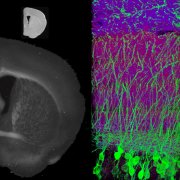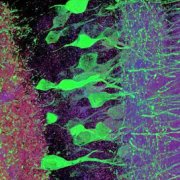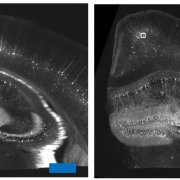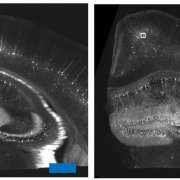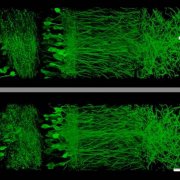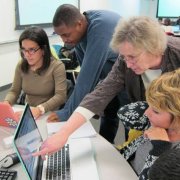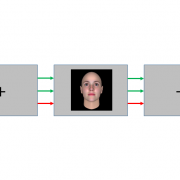February 11, 2015 - 6:30 pm
John Assad, Professor of Neurobiology at Harvard and Deputy Director of the Istituto Italiano di Tecnologia (...
10 new tenure-track positions at IIT
John Assad, Professor of Neurobiology at Harvard and Deputy Director of the Istituto Italiano di Tecnologia (IIT), will discuss IIT’s new plan to recruit more than 100 tenure track scientists over the next decade, including a current call for 10 new tenure-track...
John Assad, Professor of Neurobiology at Harvard and Deputy Director of the Istituto Italiano di Tecnologia (IIT), will discuss IIT’s new plan to recruit more than 100 tenure track scientists over the next decade, including a current call for 10 new tenure-track...
February 10, 2015 - 4:00 pm
Ed Boyden, CBMM Thrust 2: Circuits for Intelligence
*Talk was rescheduled to March 10th*
Topic: Progress on the CBMM challenge questions: What is there? What’s happening now? And why?
Abstract:
Ideally we would have maps of the molecular and anatomical circuitry of the brain, as well as of the dynamic activity of the brain, with sufficient detail to...
Topic: Progress on the CBMM challenge questions: What is there? What’s happening now? And why?
Abstract:
Ideally we would have maps of the molecular and anatomical circuitry of the brain, as well as of the dynamic activity of the brain, with sufficient detail to...
February 6, 2015 - 3:00 pm
This event is by invitation only.
February 5, 2015 - 4:30 pm
Initial proposals (300–1000 words) due March 1, 2015
The Future of Life Institute, based in Cambridge, MA and headed by Max Tegmark (MIT), is seeking proposals for research projects aimed to maximize the future societal benefit of artificial intelligence while avoiding potential hazards. Projects may fall in the fields of computer science, AI, machine learning, public policy, law, ethics, economics, or education and outreach. This 2015 grants...
January 21, 2015 - 5:45 pm
The Edge Foundation poses an annual questions to researchers and intellectuals. The Edge Question 2015 is “WHAT DO YOU THINK ABOUT MACHINES THAT THINK?”
CBMM Director Tomaso Poggio is one of the 191 contributors to have his response posted to Edge.org:
“Turing++” Questions
Recent months have seen an increasingly public debate taking form around the risks of AI (Artificial Intelligence) and in particular AGI (Artificial General Intelligence). A...
January 19, 2015 - 5:45 pm
Today’s New York Times article covers Prof. Ed Boyden’s new Expansion Microscopy research:
Expansion Microscopy Stretches Limits of Conventional Microscopes
by John Markoff
New York Times
“A new laboratory technique enables researchers to see minuscule biological features, such as individual neurons and synapses, at a nearly molecular scale through conventional optical microscopes.”
Click here to read the full article >
January 15, 2015 - 5:45 pm
by Ewen Callaway
Nature, Vol. 517, 254,
online January 09, 2015
January 15, 2015
doi:10.1038/nature.2015.16667
A recent article in Nature covers the Boyden Lab ExM research as presented by Prof. Ed Boyden at SfN 2014:
“Microscopes make living cells and tissues appear bigger. But what if we could actually make the things bigger?
It might sound like the fantasy of a scientist who has read Alice’s Adventures in Wonderland too many times, but the...
January 15, 2015 - 5:30 pm
NSF Press Release 15-002
While most efforts to understand the brain focus on new technologies to magnify small anatomical features, engineers at the MIT-based Center for Brains, Minds and Machines have found a way to make brains physically bigger.
The technique, which the researchers call expansion microscopy, uses an expandable polymer and water to swell brain tissue to about four and a half times its usual size, so that nanoscale structures...
January 15, 2015 - 5:30 pm
MIT News has published an article covering the new expansion microscopy technique developed by Prof. Ed Boyden’s lab.
MIT team enlarges brain samples, making them easier to image
New technique enables nanoscale-resolution microscopy of large biological specimens.
Anne Trafton | MIT News Office
“Beginning with the invention of the first microscope in the late 1500s, scientists have been trying to peer into preserved cells and tissues with...
January 13, 2015 - 5:30 pm
Jessica Fujimori | MIT News correspondent
MIT News published an article on the annual Quantitative Methods Workshop led by Mandana Sassanfar. Pictured above is Prof. Ellen C. Hildreth with students attending the workshop.
“The workshop, sponsored by the Department of Biology and the National Science Foundation-funded Center for Brains, Minds, and Machines, focused on how computer programming can apply to problems in biology and neuroscience.”...
January 12, 2015 - 12:45 pm
In September 2014, the Siemens Corporation generously established the CBMM Siemens Graduate Fellowship. This fellowship will provide support, for one academic year, to an MIT graduate student whose research is focused on understanding human intelligence, and which bridges two of the main CBMM disciplines (computer science, cognitive science, and neuroscience.) Proposed research should contribute to CBMM goals of developing a computationally...
December 18, 2014 - 9:00 am
December, 18-20, 2014
Montevideo, Uruguay
The workshop is part of the triennial Conference on Foundations of Computational Mathematics (FoCM’14) organized by the Society for Foundations of Computational Mathematics hosted by the Universidad de la Republica in Montevideo, Uruguay.
The goal of the...
Montevideo, Uruguay
The workshop is part of the triennial Conference on Foundations of Computational Mathematics (FoCM’14) organized by the Society for Foundations of Computational Mathematics hosted by the Universidad de la Republica in Montevideo, Uruguay.
The goal of the...
December 9, 2014 - 4:00 pm
Bill Lotter
Circuits for Intelligence – CBMM Thrust 2
Time permitting, Gabriel Kreiman will talk about “Spatiotemporal integration in visual recognition”
Time permitting, Gabriel Kreiman will talk about “Spatiotemporal integration in visual recognition”


